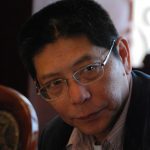
Chen Jiaying
Department of Philosophy, Capital Normal University, China
Professor Chen Jiaying was born in Shanghai in 1952. At the age of 6, he moved to Beijing and received his formal education there, which was interrupted in 1966 when the “Great Cultural Revolution” broke out. In 1968, he was sent to Inner Mongolia to farm with peasants, as a result of the “Down to the Countryside Movement.” He moved back to Beijing in 1976, took the 1977 Gaokao—the first National College Entrance Examination resumed after the Cultural Revolution—and was admitted to the undergraduate programme of the Department of Western Language and Literature at Peking University, majoring in German. The next year he became a graduate student of the Institute of Foreign Philosophy at the same university, where he earned a master’s degree in 1981.
After graduation, he taught at Peking University as a lecturer for two years, then furthered his studies at the Pennsylvania State University and received a Ph.D. degree in philosophy in 1990. He returned to China in 1993. He first taught at Peking University as Associate Professor (1994–2002), then East China Normal University as Full Professor (2002–2007) and Head of the Department of Philosophy (2003–2006). He joined the Capital Normal University in 2008 and is currently Distinguished Professor.
Professor Chen is widely recognized as an expert in phenomenology, especially in Heidegger’s philosophy. His research areas also include: analytic philosophy (especially in Wittgenstein’s Philosophy), philosophy and science, ethics and moral philosophy, and contemporary philosophy in the Chinese language in China. His major works include: (all in Chinese) An Introduction to Heidegger’s Philosophy (1995), Philosophy of Language (2003), Eidos Irreducible: A Collection of Papers (2005), Philosophy, Science, Common Sense (2007), Dianoesis (2011), Reasons underlying Values (2012), and Good Life (2015). Major Chinese translations include: Sein und Zeit by Heidegger (1987), Earth in the Balance by Al Gore (1997), Philosophische Untersuchungen by Wittgenstein (2001), Linguistics in Philosophy by Zeno Vendler (2002), The Great Ideas of Western Civilization (chief editor and translator; 2008), Wittgenstein’s Reader (editor and chief translator; 2010), Sense and Sensibilia by J. L. Austin (2010), and Ethics and the Limits of Philosophy by Bernard Williams (forthcoming).”
Happiness and Uttermost Happiness

The use of the word “happiness” is of great confusion at first look. Common people indulge themselves in extravagant food and drink and feel happy. The bold ones climb Mt. Everest and feel happy. Yan Hui led a life full of hardship but he remained happy. A sadist tortures other creatures and also feels happy. How shall we sort out the apparent confusion in the use of “happiness”?
The first thing to clarify is that happiness is not the end result we pursuit when we do something. As a rule, one drinks water because he is thirsty, not because he seeks the happiness or pleasure of drinking (although relieving the thirst does make him happy). Admittedly, people sometimes do engage in certain activities, such as taking drugs or fooling around in a brothel, for the pleasure these activities bring. Be that as it may, the fact that there are pleasure-seeking activities does not lead us to the conclusion that all or most human activities aim at acquiring pleasure or happiness.
Some people insist that pleasure or happiness is good by itself despite whether the activity connected with it is good or not. I am afraid that the phrase “by itself” is mistaken in this claim. In my view, “happiness by itself” is not meant to suggest a happiness that is cut off from the activity accompanying it; rather, it implies something like “happiness in its natural place.” Happiness is good when it is interwoven with an activity or a surrounding that is uplifting. Such an activity or a surrounding is the natural place for happiness or pleasure to reside. A sadist cuts happiness off from its natural place and imposes a degenerating activity on it. “Devilish” or the like is to be added to “happiness” if we ever speak of that person being happy.
By contrast, the happiness a virtuous man enjoys comes from nothing but the flourishing of the world and the upward spirit of his own deeds. According to old sayings, the pursuit of goodness is like climbing a mountain and virtues are associated with birth and growth. The happiness of the virtuous is pure. However, it is so not because he endures no sufferings, but rather because no matter how many sufferings he has to go through, he remains joyful as long as his existence helps lives around him flourish. His happiness is predicated on the happiness of the flourishing of lives in their entirety. This is the “uttermost happiness” the ancients spoke of; this is also Nietzsche’s Lust—“tiefer noch als Herzeleid.”
共相與會通

我從漢斯•昆的〈真正的宗教〉一文入手來談談共相與會通。
當代基督教哲學家漢斯•昆不再認爲基督教是普遍的宗教,基督教的上帝是所有人的上帝,基督教是獲得拯救的惟一途徑。這是開明的態度,但帶來一個疑問:「如果在教會和基督教之外已經存在著拯救,那教會和基督教還有什麼必要存在?」
漢斯•昆依三層標準來回答這個疑難。這三層標準是以普遍性的程度來區分的,而普遍性又是在「共同點」或「共相」的意義上得到理解的:最高的也是最普遍的一層 是基於人性的倫理標準。這一回答遠不讓人滿意。核心疑問是:如果我們歸根到底需要遵從存在著最高的也是最普遍的人性倫理標準,我何不直接依這些標準行事, 却要假道基督教或其他任何特殊的標準?
我的基本思路是:不斷向更普遍的共相上升無助於解決漢斯•昆面臨的問題。一個人在其上獲得其基本存在認同的層面,中國人、基督教徒、共產黨員,原則上是歷史—社會造就的層面。他要與不同身份認同的人之間進行交流,靠的不是放棄自己的既有身份,上升到更高的層面,而是通過平行的會通,在自身身份中找到能够接納異質內容的渠道,就像用母語翻譯別種語言一樣。會通並不依賴於各種殊相之上的普遍者,會通依賴於殊相之間的翻譯。即使說到救贖,人也只能以一種特殊的方式得到救贖。有人由基督教的上帝得到救贖,有人由華夏文明得到救贖。 有誰竟由普世宗教或普適倫理救贖,那仍然是一種特定的救贖,而不是更高的救贖。




